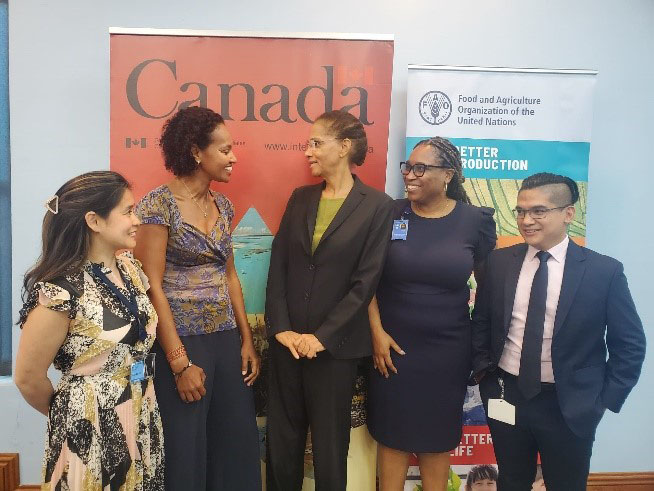Farmers from Guyana and seven other Caribbean countries are to benefit from the new CA$10 million Regional Gender-Responsive Climate-Smart Agriculture and Food Systems in the Caribbean project which was officially launched on June 3 at United Nations House in Barbados.
Financed by the Government of Canada, the four-year project (2024-2028) will be implemented by the Food and Agriculture Organization of the United Nations (FAO) in Belize, the Com-monwealth of Dominica, Grenada, Guyana, Jamaica, Saint Lucia, Saint Vincent and the Grenadines and Suriname.
A release yesterday from the Canadian High Commission here said that the collaborative effort involving Canada, the FAO, and local government and civil society partners will enhance Carib-bean farmers’ resilience to climate change and contribute to economic growth in the region.
First announced by Canadian Prime Minister Justin Trudeau during the Canada-CARICOM Summit in October 2023, the release said that the regional project will contribute to improving the livelihoods of women and youth in climate-resilient agriculture value chains in the Caribbean.
Through the project, the FAO will work closely with local Ministries of Agriculture, farmer organizations, gender bureaus, research institutions, and community-based agro-processing centres to transform and upgrade these value chains ensuring that they are market-driven using relevant data and facilitate public-private sector partnerships. The project will also heighten the use of climate-smart technologies, innovations, and practices by agricultural stakeholders to make more data-driven decisions.
Speaking at the media launch, High Commission-er of Canada to Barbados and the Eastern Caribbean, Lilian Chatterjee said “Canada recognizes the disproportionate impact of food and input price inflation, supply chain disruptions, and climate change in the Caribbean, which has exacerbated pre-existing food insecurity. Women are powerful agents of change that can actively contribute to achieving sustainable and resilient agri-food systems. Empowering women and closing gender gaps in agri-food systems is key to deliver on the Sustainable Development Goals. This new project will complement Canada’s other efforts to strengthen agricultural entrepreneurship and food systems in the region, notably the CA$19.8 million Sustain-able Agriculture in the Caribbean project and our support to Compete Caribbean”.
FAO’s Sub-Regional Coordinator for the Carib-bean, Dr. Renata Clarke stated that the organization has been promoting the use of climate-smart technologies that are adapted to the region and increase efficiency in the use of water, nutrients, biological control agents and cut the use of pesticides.
President of the Caribbean Network of Rural Women Producers, Carmen Nurse posited that, “Every farmer expects when they plant to harvest, but that is not possible. Farming is no longer predictable. Through this project we want women farmers to build their skills to continue farming using climate-smart agriculture technologies”.
The Regional Gender-Responsive Climate-Smart Agriculture and Food Systems in the Caribbean project aims to reach up to 2,500 direct beneficiaries over a four-and-a-half-year period, with women making up 50 percent of the beneficiaries and youth making up 20 percent.





